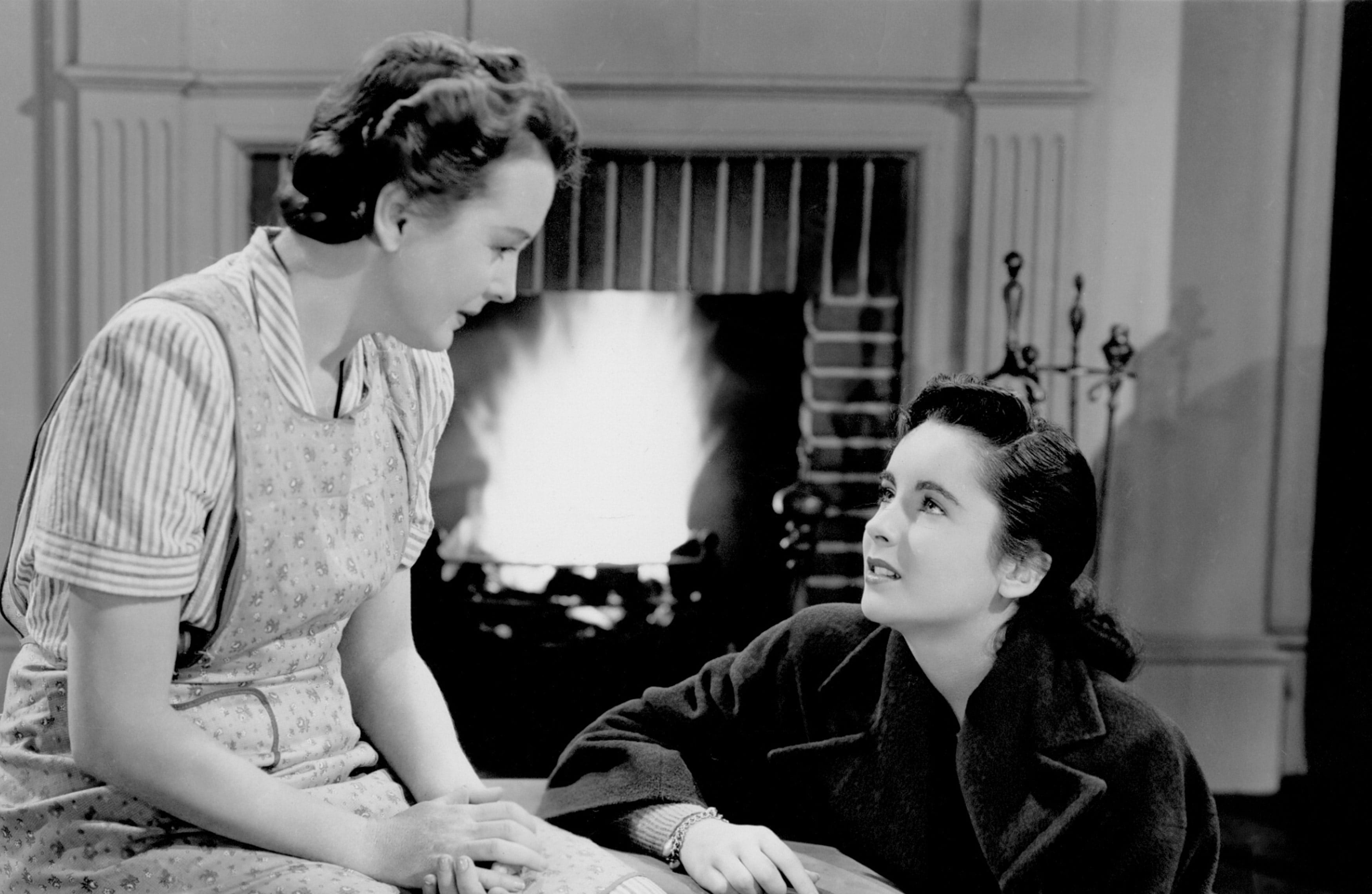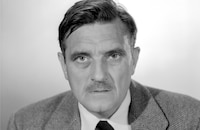Cynthia

Brief Synopsis
Cast & Crew
Robert Z. Leonard
Elizabeth Taylor
George Murphy
S. Z. Sakall
Mary Astor
Gene Lockhart
Film Details
Technical Specs

Synopsis
Louise Bishop, a devoted wife and mother, fondly recalls the time, seventeen years earlier, when she was a freshman studying music at Wyandott College: At a party celebrating the school baseball team's victory, Louise falls in love with Larry Bishop, the player who hit the home-run that won the championship. A romance ensues, and one day Louise tells Larry her hopes of continuing her studies at the Vienna Conservatory. Larry tells her that he too plans to go to Vienna to study medicine. At the end of the school year, Louise goes to Michigan for the summer, while Larry returns to his hometown of Napoleon, Illinois, to work at J. M. Dingle's hardware store. Larry and Louise return to school in the fall, and a short time after they are married, Louise discovers that she is pregnant. After agreeing to postpone their plans for future studies, Larry and Louise move to Napoleon to raise a family. Cynthia is born frail and delicate, and when the doctor bills begin to mount, Louise and Larry realize that they may never be able to study in Vienna. Louise comes out of her reverie while recalling Cynthia's protected childhood and the beginning of her high school years in Napoleon. Cynthia, who is now fifteen years old and still prone to illness, is unaware that her parents made enormous sacrifices for her. One day, while walking home from school, Cynthia pays a visit to her uncle, Dr. Fred I. Jannings, who is treating her with various shots and immunizations. Cynthia then visits her voice instructor, Professor Rosenkrantz, who suggests that she audition for the next school opera. Meanwhile, Larry, who is still working at Dingle's hardware store, struggles to make ends meet for his family and is considering buying the house that they are renting. Fred, however, refuses to give his endorsement for Larry's bank loan, and Louise rejects the idea of buying the house because she sees it as an impediment to their future plans. Uable to participate in most of the school activities because of her health history, Cynthia begins to feel like an outcast and resents being treated as if she were always sick. Her despair soon fades, however, when her singing attracts the attention of the school's most popular student, Ricky Latham. A romance blossoms, much to the dismay of Cynthia's jealous cousin, Fredonia Jannings, and her friend, Stella Regan. Cynthia is eventually awarded the leading role in the school play, but Louise and Larry are concerned that she does not have the physical strength to perform in the show. Their fears are soon realized when Cynthia falls ill with the flu and is forced to bow out of the play. Fred later admonishes Louise for encouraging Cynthia beyond her capacity, but Louise wonders whether they have relied too heavily upon Fred's advice. Cynthia returns to school a few days before the spring prom, and Ricky asks her to be his date for the dance. The night of the dance, Louise deceives her husband and secretly allows Cynthia to attend the dance against his wishes. While Cynthia has a wonderful time at the ball, Larry learns that he was tricked and bitterly criticizes Louise. The following morning, Larry oversleeps and goes into work late for the first time in fifteen years. When Larry learns that Dingle is upset about his tardiness, he angrily accuses his boss of unfair treatment, quits his job and plans to move his family to Chicago. Louise is happy to see that her husband has finally stood up for himself, but Cynthia rejects her parents' plans to move. The Bishops decide to stay in Napoleon, and their financial troubles are solved when Dingle shows up to beg Larry to return to his job.

Director

Robert Z. Leonard
Cast

Elizabeth Taylor

George Murphy

S. Z. Sakall

Mary Astor

Gene Lockhart

Spring Byington

James Lydon

Scotty Beckett
Carol Brannan
Anna Q. Nilsson

Morris Ankrum
Kathleen Howard
Shirley Johns
Barbara Challis
Harlan Briggs

Will Wright
Charles Bradstreet
Mary Jane Smith
Joan Elmes
Dolores Dey
Leslie Haar
Stanley Haar
Minerva Urecal
Walter Soderling
Charles Woolf
William Tannen
Erville Alderson
Eula Guy
Colleen O'neill
Tom Leffingwell
Mickey Martin
Crew
Ralph Blane
Harold Buchman
Paul G. Chamberlain
Jack Dawn
Ralph Freed
Cedric Gibbons
Johnny Green
Irene
Bronislau Kaper
Charles Kaufman
Edwin H. Knopf
Robert Z. Leonard
Hugh Martin
Charles Schoenbaum
Douglas Shearer
Johann Strauss Ii
Marvin Stuart
Robert Surtees
Irvine Warburton
Edwin B. Willis

Film Details
Technical Specs

Articles
Cynthia
After National Velvet, MGM was unable to come up with a satisfactory follow-up for its young star, and Elizabeth was off the screen for a year and a half. She kept busy, writing a children's book, Nibbles and Me (1946), about her pet chipmunk, and giving interviews to teen magazines. When she finally did make another film, Courage of Lassie (1946), she got star billing for the first time, but played a distinctly supporting role to a collie. Meanwhile, the pretty little girl was blossoming into a beautiful teenager. She also was developing a backbone, and an awareness of her importance to MGM. When studio head Louis B. Mayer decided that she would sing and dance in her next film, Sally in Her Alley, Elizabeth and her mother met with him to ask if Elizabeth could take singing and dancing lessons. Mayer began cursing and shouting at Mrs. Taylor, calling her stupid and meddlesome. Elizabeth, infuriated, shouted back, "Don't you dare speak to my mother like that! You and your studio can both go to hell!" She stormed out, leaving Mrs. Taylor to placate Mayer. Elizabeth refused to apologize, and never spoke to Mayer again. Sally in Her Alley was never made.
Instead, Elizabeth made Cynthia, and the role suited her perfectly. Like Cynthia, the 15-year old Elizabeth had been sheltered and coddled by her mother and by the studio. Like Cynthia, she could not live a normal life, didn't have friends, and longed for independence and romance. According to production files, Cynthia's writers and director Robert Z. Leonard asked for the star's input for the character, and she gave Cynthia the traits that she had or that she admired, like honesty and compassion. And maybe something else, too: Kitty Kelley's biography, Elizabeth Taylor: the Last Star quotes a co-worker as saying, "I think she might have carried her ill and ailing on-camera role into real life."
Mary Astor, who played Cynthia's mother, watched her young co-star closely, and made some astute observations. "She was beginning to be conscious in a very normal, teen-age way of her own beauty. She was also bright. Very bright. Head-of-the-class type of brightness," Astor later wrote in her memoir, A Life on Film. "Elizabeth was cool, and slightly superior. There was a look in those violet eyes that was somewhat calculating, as though she knew exactly what she wanted and was quite sure of getting it." Astor herself wasn't getting what she wanted. The Oscar®-winning actress was typecast as everybody's mother, and she was frustrated and battling alcoholism. When her MGM contract ended in 1949, Astor checked into rehab, but her personal struggles continued for several years. Eventually, she began writing as therapy, and produced two volumes of memoirs and several novels. She also resumed her acting career.
Critics had praise for both Taylor's and Astor's performances. "Miss Taylor does a brilliant job with the title role," wrote Howard Barnes in the New York Herald Tribune. "She plays an unwilling invalid with grave charm." But they also dismissed the film. "Cynthia is a synthetic morsel -- right out of the Metro candy box," according to Bosley Crowther of the New York Times. But more than 40 years later, British critic Alexander Walker re-evaluated, calling Cynthia one of Taylor's "unjustly forgotten triumphs of tact, sympathy, pathos and insistent self-assertion; and the identification with Cynthia by the bobby-soxers who saw it must have been total. It is one of the most likeable movies of adolescent independence."
Director: Robert Z. Leonard
Producer: Edwin H. Knopf
Screenplay: Charles Kaufman, Harold Buchman, from the play The Rich, Full Life by Vina Delmar
Cinematography: Charles Schoenbaum
Editor: Irvine Warburton
Costume Design: Irene
Art Direction: Cedric Gibbons
Music: Bronislau Kaper
Principal Cast: Elizabeth Taylor (Cynthia Bishop), George Murphy (Larry Bishop), S.Z. Sakall (Prof. Rosenkrantz), Mary Astor (Louise Bishop), Gene Lockhart (Dr. Fred I. Jannings), Spring Byington (Carrie Jannings), James Lydon (Ricky Latham).
BW-98m.
by Margarita Landazuri

Cynthia
Quotes
Trivia
Notes
According to a July 1945 Hollywood Reporter news item, M-G-M acquired the rights to Viña Delmar's play by agreeing to pay fifteen percent of the play's gross up to $225,000. The studio also invested between $20,000 and $25,000 in the stage production in exchange for a twenty-five percent interest. A September 1945 Hollywood Reporter news item noted that Elizabeth Taylor was originally set to star in the play, but her mother refused to allow her to travel east for the role. Although the same news item noted that M-G-M's financial participation in the play was contingent upon Taylor playing the title role, no information has been found to suggest that the studio renegotiated its deal after Taylor's departure. Taylor, George Murphy and Mary Astor reprised their roles for a Lux Radio Theatre version of the story that was broadcast on June 23, 1947.















